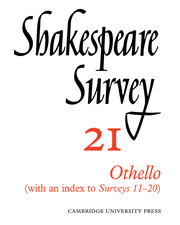Book contents
- Frontmatter
- ‘Othello’: A Retrospect, 1900–67
- The Two Parts of ‘Othello’
- ‘Othello’: A Tragedy Built on a Comic Structure
- ‘Othello’ and the Pattern of Shakespearian Tragedy
- ‘Othello’, ‘Lepanto’ and the Cyprus Wars
- Iago—Vice or Devil?
- Thomas Rymer and ‘Othello’
- Delacroix’s Tragedy of Desdemona
- Verdi’s ‘Otello’: A Shakespearian Masterpiece
- William Hervey and Shakespeare’s Sonnets
- Imagery and Irony in ‘Henry V’
- Shakespeare and the Actors: Notes towards Interpretations
- The Year's Contributions to Shakespearian Study 1 Critical Studies
- 2 Shakespeare’s Life, Times and Stage
- 3 Textual Studies
- Index to Volume 21
- General Index to Volumes 11–20
- Plate Section
2 - Shakespeare’s Life, Times and Stage
Published online by Cambridge University Press: 28 March 2007
- Frontmatter
- ‘Othello’: A Retrospect, 1900–67
- The Two Parts of ‘Othello’
- ‘Othello’: A Tragedy Built on a Comic Structure
- ‘Othello’ and the Pattern of Shakespearian Tragedy
- ‘Othello’, ‘Lepanto’ and the Cyprus Wars
- Iago—Vice or Devil?
- Thomas Rymer and ‘Othello’
- Delacroix’s Tragedy of Desdemona
- Verdi’s ‘Otello’: A Shakespearian Masterpiece
- William Hervey and Shakespeare’s Sonnets
- Imagery and Irony in ‘Henry V’
- Shakespeare and the Actors: Notes towards Interpretations
- The Year's Contributions to Shakespearian Study 1 Critical Studies
- 2 Shakespeare’s Life, Times and Stage
- 3 Textual Studies
- Index to Volume 21
- General Index to Volumes 11–20
- Plate Section
Summary
The reviewer’s first welcome must go this year to A Shakespeare Encyclopaedia, edited by Oscar James Campbell and Edward G. Quinn, a volume that will be used wherever Shakespeare is read. It contains articles on ‘all the essential information available about every feature of Shakespeare’s life and works’, ranging from entries on every play, with a full synopsis, a summary of its stage history, and fairly full discussions of text, date, sources, etc., down to brief notes on the better-known critics and other interested parties, including Henry James, Herman Melville, Molière, and even less likely names. In short, if it errs, it is on the side of fullness—and who will begrudge that? Title-pages are reproduced, important quotations are given in old-spelling, and illustrations abound, manuscripts, maps, Stratford houses, playhouses, famous Elizabethans, and stills from Olivier’s films. In addition experts have contributed essays on their own special fields: Fredson Bowers (textual criticism), Douglas Bush (classical myth in Shakespeare), Alfred Harbage (style), G. B. Harrison (topical references), Kenneth Muir (sources), and so on. Having browsed here and there I find the Encyclopaedia impressively sound and up-to-date (to the year 1964, and, occasionally, 1965), and can fault it rarely. Should Southampton be called ‘the only man who can be positively identified as Shakespeare’s patron’ (p. 617)? The Folio dedication surely identifies Pembroke and Montgomery as two more; and elsewhere the Lord Chamberlain figures as the ‘patron’ of Shakespeare’s company (p. 102).
- Type
- Chapter
- Information
- Shakespeare Survey , pp. 141 - 157Publisher: Cambridge University PressPrint publication year: 1969

